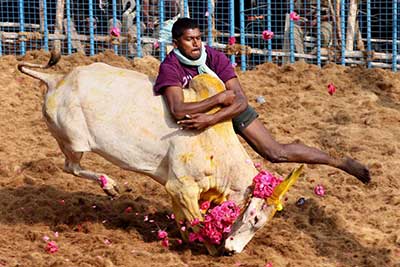Date: 05/01/2023
Relevance: GS-2: Government policies and issues arising out of it
Key Phrases: Jallikattu, Animal Welfare Board of India v. A. Nagaraja, Prevention of Cruelty to Animals Act (PCA Act), 1960, Right to life for animals, Entry 17 of the Concurrent List of Schedule VII.
Why in News?
- A Constitution Bench of the Supreme Court of India will deliver its verdict on the validity of Tamil Nadu’s law permitting the practice of jallikattu in the State.
Supreme Court Judgement:
- In 2014, in Animal Welfare Board of India v. A. Nagaraja, a two-judge Bench of the Supreme Court declared jallikattu illegitimate.
- The court found that the practice was cruel and caused the animal unnecessary pain and suffering.
- Since then, Tamil Nadu has made efforts to resurrect the sport’s legality. It is that act of revival that is now at stake.
Animal rights and safety:
- The hearings underlined the deficiencies inherent in the Constitution when it comes to addressing questions of animal welfare.
- None of the guarantees contained in Part III of the Constitution, which
deals with fundamental rights, are explicitly conferred on animals.
- Article 14 (right to equality) and Article 21 (right to life and personal liberty) are bestowed on persons.
- Until now, it is generally understood as “persons” to mean human beings, or, in some cases, associations of human beings, such as corporations, partnerships, trusts, and the like.
- Some of the Directive Principles of State Policy and the Fundamental Duties, contained respectively in Parts IV and IVA of the Constitution, reflect a responsibility placed on the state and on human beings to protect and improve the natural environment. But these are unenforceable obligations.
Amendment to PCA act in 2017:
- Tamil Nadu amended the Prevention of Cruelty to Animals Act (PCA Act), in 2017— it did so on the basis that both the state and the Union government have the power to legislate on issues concerning cruelty to animals — it specifically excluded jallikattu from the confines of the statute’s various protections.
Arguments of petitioners:
- Judicial review of legislation can broadly be made on two grounds:
- Whether the legislature possesses the competence to enact the law;
- Both the Union and the State legislatures have equal power to make laws on the ‘prevention of animal cruelty’ — relatable as it is to Entry 17 of the Concurrent List of Schedule VII to the Constitution.
- But the law regulating jallikattu by excluding the practice from the PCA Act, has the effect of condoning cruelty on animals and hence must be seen as a colourable action that bears no nexus to Entry 17.
- Whether the law violates one or the other of the fundamental rights
delineated in Part III of the Constitution.
- In A. Nagaraja, the court had held that jallikatu, in and by itself, amounted to a violation of the existing provisions of the PCA Act, and the fundamental duty contained in Article 51A(g), which requires citizens “to protect and improve the natural environment including forests, lakes, rivers, and wildlife, and to have compassion for living creatures.”
- The effect of this violation, the court held, had a direct bearing on the right to life contained in Article 21.
- The Bench was conscious that the right in Article 21 is conferred only on human beings.
- But the expanded meaning of the word “life” over the years, which now included a right against disturbance to the basic environment ought to mean that animal life must also be treated with “intrinsic worth, honour, and dignity,” the court found.
- Whether the legislature possesses the competence to enact the law;
Way Forward:
- Right to life for animals:
- On any reasonable reading of the Constitution, it might be difficult to hold that animals are promised rights to life and personal liberty under Article 21 and equality under Article 14 — a conclusion to that effect could well lead to bizarre consequences.
- Personhood:
- Arguments in favour of personhood invariably spring out of a belief that animals, especially certain kinds of animals such as apes, elephants, and whales, share much in common with human beings.
- But as some philosopher says, our duty of care towards animals needs to hardly originate out of our similarities to them.
- We must instead see “each form of animal life in all its beauty and strangeness.”
- Increasing the scope of Article 21:
- Rather than focusing on personhood, the better approach to the dispute, the approach that maintains a greater fidelity to our Constitution’s text and values, is to see it in the context of our own right to live in a world that treats animals with equal concern.
- Article 21 no doubt safeguards only the rights of human beings, but the word “life” is today understood to mean something more than mere existence; it means an existence that allows us, among other things, to live in a clean and healthy environment.
- Indeed, it is possible to argue that a human right to a healthy environment would include a human right to animal welfare.
- Viewed thus, our governments would be constitutionally obligated to take measures to help the flourishing of our fellow creatures.
- In this conception, legislating to prevent animal cruelty is no longer an option; it transforms into a binding duty cast on the state.
Source: The Hindu
Mains Question:
Q. "The constitution safeguards only the rights of human beings, but the word "life" today should mean something more than mere existence." Discuss in the context of the prevention of animal cruelty.






















